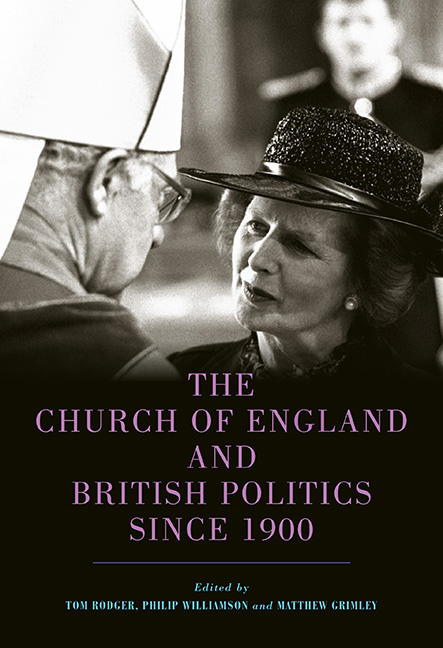Book contents
- Frontmatter
- Contents
- Notes on contributors
- Preface
- Abbreviations and locations of principal collections
- Introduction: the Church of England, the British state and British politics during the twentieth century
- 1 The politics of Church defence: Archbishop Davidson, the national church and the ‘national interest’, c. 1900–14
- 2 Archbishops and the monarchy: leadership in British religion, 1900–2012
- 3 Ecclesiastical conservatism: Hensley Henson and Lord Hugh Cecil on Church, state and nation, c. 1900–40
- 4 Hensley Henson, the prayer book controversy and the conservative case for disestablishment
- 5 Assembling an Anglican view of self-governing sexual citizenship, 1918–45
- 6 Politics in the parish: Joseph Needham at Thaxted, c. 1925–85
- 7 Anglicans, reconstruction and democracy: the Cripps circle, 1939–52
- 8 Parliament and the law of the Church of England, 1943–74
- 9 The Church of England and religious education during the twentieth century 199
- 10 Spiritual authority in a ‘secular age’: the Lords Spiritual, c. 1950–80
- 11 ‘A sort of official duty to reconcile’: Archbishop Fisher, the Church of England and the politics of British decolonization in East and Central Africa
- 12 A ‘baffling task’: Archbishop Fisher and the Suez Crisis
- 13 John Collins, Martin Luther King, Jr, and transnational networks of protest and resistance in the Church of England during the 1960s
- 14 The Church of England, minority religions and the making of communal pluralism
- Index
- STUDIES IN MODERN BRITISH RELIGIOUS HISTORY
12 - A ‘baffling task’: Archbishop Fisher and the Suez Crisis
Published online by Cambridge University Press: 28 April 2020
- Frontmatter
- Contents
- Notes on contributors
- Preface
- Abbreviations and locations of principal collections
- Introduction: the Church of England, the British state and British politics during the twentieth century
- 1 The politics of Church defence: Archbishop Davidson, the national church and the ‘national interest’, c. 1900–14
- 2 Archbishops and the monarchy: leadership in British religion, 1900–2012
- 3 Ecclesiastical conservatism: Hensley Henson and Lord Hugh Cecil on Church, state and nation, c. 1900–40
- 4 Hensley Henson, the prayer book controversy and the conservative case for disestablishment
- 5 Assembling an Anglican view of self-governing sexual citizenship, 1918–45
- 6 Politics in the parish: Joseph Needham at Thaxted, c. 1925–85
- 7 Anglicans, reconstruction and democracy: the Cripps circle, 1939–52
- 8 Parliament and the law of the Church of England, 1943–74
- 9 The Church of England and religious education during the twentieth century 199
- 10 Spiritual authority in a ‘secular age’: the Lords Spiritual, c. 1950–80
- 11 ‘A sort of official duty to reconcile’: Archbishop Fisher, the Church of England and the politics of British decolonization in East and Central Africa
- 12 A ‘baffling task’: Archbishop Fisher and the Suez Crisis
- 13 John Collins, Martin Luther King, Jr, and transnational networks of protest and resistance in the Church of England during the 1960s
- 14 The Church of England, minority religions and the making of communal pluralism
- Index
- STUDIES IN MODERN BRITISH RELIGIOUS HISTORY
Summary
Reflecting on the global political and ecclesiastical changes of the second half of the twentieth century, Geoffrey Fisher's first biographer, William Purcell, asked: ‘Will there be another quite like him?’ Fisher, Purcell suggested, was a characteristic product of a period when Britain was an imperial power and the see of Canterbury enjoyed a ‘long taken for granted’ primacy within the Anglican Communion. However, by the last years of his life, the British empire had largely gone, the balance of power within worldwide Anglicanism and Christianity more generally was shifting and many traditional theological positions were becoming subject to radical questioning. Consequently, Purcell concluded, Fisher might well be ‘the last of the Archbishops of Canterbury who could deal in certitudes from a position of authority, having behind it the prestige of a materially great power’.
Yet Purcell also noted that Fisher was the first archbishop of the age of television, of press conferences and of fast long-distance air travel. While he was the last archbishop to preside over an Anglican Communion of which large parts were dependent territories of the British empire, within that communion he initiated a programme of dispersal of power from Lambeth to autonomous territorial churches: in most cases this preceded the political decolonization which would change the map of the world so strikingly in the 1950s and 1960s. Within Britain, social change would affect the position and authority of the Church of England. Although claims that Britain underwent a religious revival in the 1950s are disputed,3 there is little doubt that the Church of England was more influential in social and political life in the earlier post-war period than it is today. But as early as 1958, Edward Carpenter, in an introduction to a selection of Fisher's addresses and sermons, argued that the public influence of the archbishop of Canterbury increasingly depended
on the gifts and character of the archbishop himself; on his ability to give effective leadership at the right time, to be sensitive to, and to sympathize with, the mood of the nation, while at the same time lifting it into the rarer atmosphere of the Kingdom of God.
- Type
- Chapter
- Information
- The Church of England and British Politics since 1900 , pp. 262 - 278Publisher: Boydell & BrewerPrint publication year: 2020



